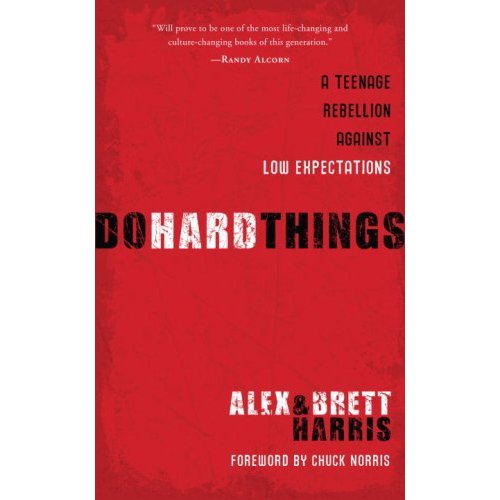Rebels for Christ: Harris Twins Challenge Teens to Do Hard Things

Twin brothers Brett and Alex Harris weren't on a mission to inspire their generation. They were bored 16-year-olds facing a long summer when their father, Gregg Harris, dropped a stack of classics onto the kitchen table and challenged them to better themselves. From that summer reading list sprung a blog, and from that blog exploded an international teen “rebelution” – the term they coined to describe a “rebellion against low expectations.”
While the brothers' blog encourages teens to “rebel” against cultural apathy by embracing personal responsibility, their message to "do hard things" exceeded even their expectations – taking them as far as Japan and as high as the Alabama Supreme Court where they interned at the wise age of 16. Now 19, their journey takes another exciting turn with the publication of their first book, Do Hard Things (Multnomah, 2008).
As a late 20-something, even I found myself drawn into their book, so I was looking forward to meeting these two at the International Christian Retail Show in July to discuss it with them. Not to mention, I wanted to exchange some fun twin stories since I am also half of a twin pair. Unfortunately, Alex missed our early morning appointment due to a minor injury he sustained rough-housing with younger siblings (my first clue they are normal teens). Thankfully, Brett was kind enough (and healthy enough) to chat with me.
Crosswalk: Your book, Do Hard Things, is part of a long journey for you two. You say you never expected to write it. Can you give us some background?
Brett Harris: Well, we have a father who has written a book, we have an older brother [Joshua Harris] who has written multiple books including one that was just a runaway bestseller, so it was always kind of in the back of my mind that someday we might write a book. But we definitely did not plan on doing it when we were 18. We felt like we wanted to just get more life experience, which is a good thing, a good desire, but it wasn't God's plan.
So, it happened back in Spring 2007. [We were] just writing on our website. We were doing our conferences … and suddenly everyone became aware of that. We were contacted by six different major Christian publishers in a period of about a month and a half. We were really in an unprecedented situation as 18-year-old, first-time authors … and being able to pick and choose which publisher. So it was amazing. We really cannot take any credit for it.
CW: So the book sets out to "bust" the common cultural views of the teen years. Could you explain what you call the "Myth of Adolescence" and how teens get trapped in it?
BH: Well, the "Myth of Adolescence" is really our culture's view of the teen years as a vacation from responsibility, a time to goof off and have fun, and that is in opposition to what we believe is the biblical and historical view -- where the teen years are the launching pad of life.
We see 20-somethings and even 30-somethings who are still acting like teenagers, who are still living with their parents, jumping from job to job … having fun, but going nowhere. That has been a phenomenon documented by Time Magazine -- they have names for these: "kidults" or "adultescence." Our view, and I think it has also been recognized in the coverage, is that … the teen years and adolescence are not just a biological stage, it is a cultural mindset. It is something that if you keep thinking this way, you keep living this way. Responsibility is a muscle that you have to exercise. [If you fail to] you are going to be disappointed and ill equipped to handle the challenges that God brings your way.
CW: You talk about five kinds of "hard" in your book. Why are these so important to recognize?
BH: The five kinds of hard are categories that we came up with while we were writing the book to help people identify areas or ways that they could apply the message: [1] Doing things that take you outside your comfort zone, [2] doing things that go above and beyond what's expected or required, [3] doing big things that are too big to do alone, [4] things that don't pay off immediately -- the small hard things, [5] and then finally things that take a stand [against the crowd].
It is really helpful, in our opinion, to give people categories as opposed to a list of, you know, "You need to do your schoolwork," because each person is going to be different. We give examples in all these categories of what we are talking about, but the goal is for each person to say, "God, what have you called me particularly to do, and what is my holy ambition, the thing that I really, really want to do, and You want me to do also?"
CW: Beyond recognizing the five kinds of hard, you write about three pillars of rebelution: Character, Competence, and Collaboration. Could you spend a little bit of time explaining those?
BH: As far as the three pillars, [these] are three things that we believe are crucial to any endeavor. We need to have character first of all, which is doing [hard] things for the right reasons, you know, having the right motives, being distressed or even righteously angry. You really have to have a changed heart by the Gospel of Jesus Christ to have pure motives … because it is so easy for people to do things for selfish reasons, for the wrong reasons, for personal glory.
So, we think character is so crucial, but the problem is there are a lot of Christians who have great character, who are motivated for the right reasons ... but they don't have the competence to actually carry them out. They are angry, they are upset with the world, but they are not able to change the world. Competence, we believe is not just an issue of gifts or natural ability, it is really just an issue of preparation. We develop competence by exerting ourselves, building up that muscle, and then having them [character and competence] together, because there are plenty of very competent people who are doing very destructive things. Hitler, for instance, would be someone who was very good at what he did, but what he did was very wrong and very evil.
But even if you have character and competence ... if you're a lone ranger, you're in trouble. You are not going to be able to really accomplish those big history-shaping things. So, we really stress collaboration as not only a way to do exponentially more, but as a way to compensate for what you lack maybe in competence, to have the humility and the character to recognize, "Here's where I am weak, I could use someone to help me."
CW: I have to say you guys did a really good job with the book. You mention that you cannot take any of the credit, and something that really struck me about meeting you is how you are an ordinary teen. But a lot of people may read your book and think, Wow, that is great, but where do I start? What can you tell people who want to start doing hard things, but feel like you guys are probably special, probably gifted, while they are just typical teenagers?
BH: God does give different gifts to people. Other people might not be called to write books or speak at conferences or intern at Supreme Courts. [So] we wrestled with the feelings of "Are we different, can we relate?" when we wrote the book. Then we realized, well, we are totally the same [as other teens], we are just living a different way. We definitely shun the label of prodigy. We took one simple step of starting a blog, which any young person can do, and it did explode. The fact that we have done some of these things is, in our view, just intended to be an example that these ideas do work, and ... gives us a level of credibility.
CW: You've had a lot of teens respond to your message. Could you share your favorite story of a teenager who stepped out to do hard things?
BH: I will give you a little variety, and then I will focus on one specific one that we just learned about. So, we have … this girl who has had nannies her whole life and her nanny had just quit. She read our book, and she came into the kitchen and realized if the nanny can clean up the kitchen in 15 minutes, she can do it too.
You move up into older teens. We have been especially excited to see young men who are reading the book, and they are immediately volunteering to lead in some way, whether it be in their youth group, whether it be at school.
You can go even older, college age or post college age, young people who are reading the book, and they are saying, "Let's start a summer camp for kids in Jamaica this summer. Let's do hard things for Jesus this summer." That is a 28-year-old.
Then we have 40- and 50-year-olds who are saying, "You know what, here is a vision I have had my whole life, and I have just always been held back by fear and by low expectations … so I am actually going to start pursuing this."
The one in particular I will share, which is just kind of neat and is not necessarily like the ultimate example of teens doing hard things, but it is definitely one that we're excited about: There is a young man named Zac Sunderland. He is attempting to be the youngest person to solo circumnavigate the world -- which means sail around the world in a boat by himself. He is 16 years old. He was born on a boat. He has already logged 15,000 miles at sea, and his parents are meeting him at each stop along the way, but he has gotten tons of media attention. He will be the youngest person in history to ever do that if he accomplishes it, which he has every support in place to do.
We actually found out about him because he was wearing a "Do Hard Things" T-shirt.
CW: Very neat. For the parents who may be reading - you write about your dad's role in sort of jump-starting this whole experience. Do you have any words for parents on what they could do to encourage their teens to do hard things?
BH: Absolutely. The main encouragement I would have for parents, and something our parents did such a good job of, is to definitely challenge us, to give us tools not toys, to provide platforms and opportunities for us to present something, [like] getting us involved in speech and debate competition. Whatever it was that would help give us incentive to really apply ourselves, to stoke passions.
Sometimes [we] get feedback from people saying, "Well, what about parents who have too high expectations?" Everyone knows those parents -- sometimes their children actually break down. In our experience, the problem has not been the high expectations. The problem has been the emphasis on success over faithfulness [to God] ... success in terms of certain grades, certain college, certain kind of job. The expectation leaves no room for failure even when doing the right thing, failing even though you tried your hardest but growing.
If that [failure] is included in the high expectations, we have never seen the kind of problems that people associate with too high expectations.
CW: So, what is next for you and your brother as you enter the 20-something stage? Will your mission change?
BH: Our heart is not to get stuck in the teen years. We don't want to be 40 years old and still be, like, teenagers rebelling against low expectations!
We have been really excited because we have had some ideas … that we feel like are the next step, especially based on the feedback we have been getting from the book where young people are saying, "Alright, I am fired up to do hard things. Here are the things I have already started doing, but I don't really feel like I have my holy ambition." Or "I found my holy ambition, but I don't have the resources, I don't have the connections, I don't know how to actually start."
So, we are planning on putting together a new event that would essentially answer that question and would provide for that need. We would move into the role of facilitating young people who have a vision, who have a passion -- connecting them with the mentors, connecting them with the spiritual and financial venture capitalists, and then just sharing tons and tons of holy ambitions with the ever-growing audience of young people who are looking for holy ambitions to get excited about. A brief description of the event would be 3 days, 50 speakers, 18 minutes each to give the talk of their lives to 500 of the most dedicated young people in the country. Each talk would be professionally captured on video, uploaded to a state-of-the art website, and made available for free downloading.
CW: Thanks for taking the time to chat. Is there anything else you would like to add for our readers?
BH: I think just what you already mentioned … that we're normal. We feel like the worst thing that could happen would be for people to view us or any of the other young people whose stories we share as different -- and that is the natural response, to say, "Oh, they are different. Therefore, I don't have to learn from them. It's just a neat story." Make sure that whatever comes out of this interview is really emphasizing God's ability to use the most unlikely heroes. That is what He did all throughout the Bible, whether it is David, whether it is Mary, the mother of Jesus, whether it is the prophet Jeremiah, the least of Jesse's sons.

*Lead photo: Brett is sitting on the left, Alex on the right.
Originally published August 04, 2008.





